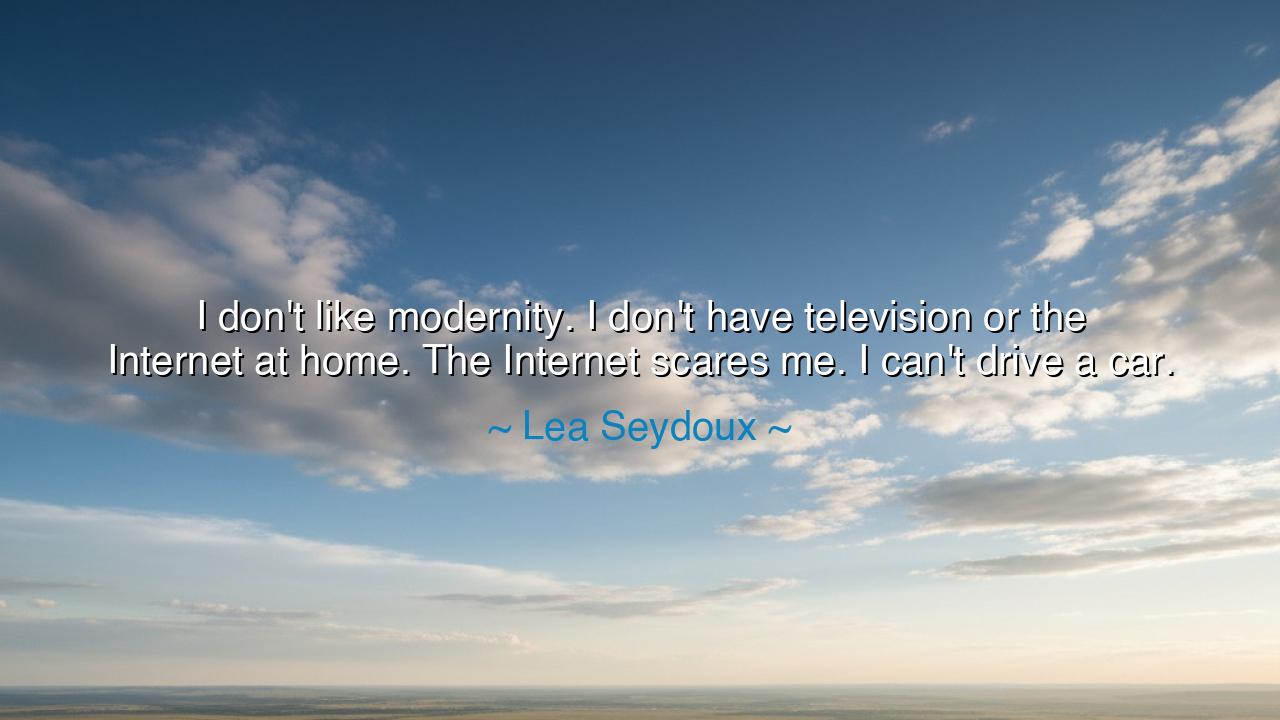
I don't like modernity. I don't have television or the Internet
I don't like modernity. I don't have television or the Internet at home. The Internet scares me. I can't drive a car.






The words of Léa Seydoux — “I don’t like modernity. I don’t have television or the Internet at home. The Internet scares me. I can’t drive a car.” — sound, at first, like a confession, but beneath their quiet tone lies a profound act of resistance. In an age intoxicated by speed, noise, and endless information, she speaks as one who still cherishes silence, still believes in the ancient rhythm of being. Her words echo the wisdom of the old philosophers, who taught that not every advancement of man is an advancement of the soul. Seydoux, in rejecting modernity, reminds us that to live deeply, one must sometimes stand apart from the rushing river of the world, and dwell instead beside the still waters of simplicity.
To say “The Internet scares me” is not fear of technology itself, but of what it represents — the loss of mystery, the disappearance of solitude, the constant invasion of the mind by distraction. In this, she joins a long lineage of thinkers who have warned against the intoxication of progress. The ancient Greeks told the tale of Prometheus, who stole fire from the gods — a symbol of man’s power to create, but also to destroy. With each new flame of invention, humanity gains light but risks burning its own hands. The Internet, for all its brilliance, burns too — consuming attention, intimacy, and reflection. Seydoux’s fear, then, is not cowardice, but wisdom: she senses the price hidden behind the glow of every screen.
When she says she cannot drive a car, it is not incapacity, but poetry. The car, symbol of freedom in the modern age, becomes in her eyes a burden — a machine that separates us from the very world it claims to help us explore. Once, to travel was to feel the land beneath one’s feet, to listen to the wind, to meet others face to face. Now, man passes through the earth like a shadow, moving fast but seeing little. Seydoux’s refusal to drive is a return to slowness, a return to presence — a rebellion against the tyranny of velocity. Like the monks of old who chose the cloister over the marketplace, she chooses reflection over rush, stillness over spectacle.
In her rejection of television and the Internet, we glimpse a hunger for authenticity. To be constantly connected, the ancients would have said, is to lose connection altogether — for the soul needs quiet to remember itself. Think of Henry David Thoreau, who retreated to Walden Pond to live deliberately, to “front only the essential facts of life.” He too withdrew from the noise of his age, not because he despised it, but because he longed to hear what it drowned out. Seydoux’s modern solitude is the same — not disdain for the world, but a plea for depth within it. She would rather know a single moment fully than rush through a thousand unseen.
And yet, her words also carry sorrow — for in rejecting modernity, she acknowledges her separation from the world she inhabits. To live apart is to feel both purity and loneliness. The wise have always carried this burden. The prophet in the desert, the poet in exile, the hermit in the mountains — each has felt the ache of isolation, yet found there the strength to see the truth of mankind more clearly. Seydoux’s simplicity is not an escape, but an act of clarity: she refuses to let technology dictate identity. In an age where the self is often constructed through screens, she guards her humanity like a flame in a storm.
History, too, remembers those who resisted the march of modernity to preserve something eternal. The Japanese tea masters of the Edo period, for example, turned away from the growing chaos of their cities to perfect the ritual of stillness — the tea ceremony, where a single bowl of tea became the universe. Their art was a sanctuary from excess, a declaration that meaning lives not in abundance, but in attention. Seydoux’s choice mirrors theirs. By stepping back from modern invention, she steps closer to essence — to what is pure, deliberate, and real.
The lesson of her words is one of balance: that progress must never outpace purpose. We are surrounded by tools that promise ease, yet each demands a portion of our presence in exchange. To live wisely, we must learn when to connect and when to disconnect, when to move swiftly and when to stand still. Let us, then, reclaim moments of silence. Walk without a screen. Sit beneath a tree. Listen not to the endless stream of news, but to the rhythm of your own breath. For in the quiet absence of modern noise, the ancient voice of the soul still speaks — and it tells us, as Seydoux’s words do, that peace is not found in the multitude of things, but in the depth of being.
So, take her message as a gentle command from one who dares to stand apart: do not be mastered by modernity. Let technology serve you, but never let it steal your wonder. For the world’s noise grows louder every day, but wisdom — true wisdom — still lives in silence.






AAdministratorAdministrator
Welcome, honored guests. Please leave a comment, we will respond soon